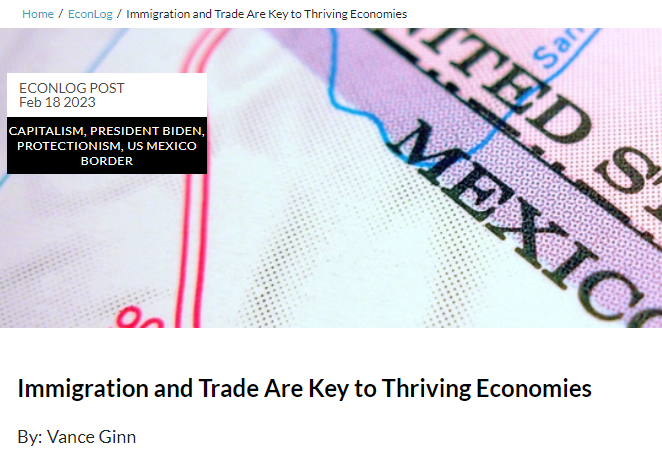|
President Biden recently visited the humanitarian crisis along the U.S.-Mexico border but mostly used it as a political stunt to offer more failed policies and chastise Republicans. Republicans have also had years to solve immigration issues, but the situation continues. Meanwhile, Biden and former President Trump have similar protectionist trade policies, which have come at a cost to Americans.
Given the gains from immigration and trade in a globally connected economy, many on the left and the right overlook how government failures of a broken visa system and costly big-government are the source of these problems. And this oversight leads to many of their big-government solutions that aren’t rooted in sound economics but rather winning votes. Immigration and trade overlap in many ways as they are exchanges with people across international borders. Given the rule of law and private property rights are essential in our republic, there are roles for government to enforce the rules of the game but otherwise politicians should address bad policies in the U.S. before trying to blame tangential problems on other countries or “market failures.” For instance, have you ever heard that “immigrants and trade steal jobs”? It’s a myth. The notion that immigrants “steal jobs” supposes that adding more people and different kinds of knowledge and innovation to the economic pie somehow prohibits the native-born population from prospering. Simply put, the aversion to immigrants joining the American workforce is rooted in fear of competition. Moreover, much of the skepticism fueling fear of more working immigrants tends to also be directed at international trade. But the gains to be acquired from immigration and trade outweigh the suspected costs. We would be wise to let markets work within the rule of law instead of imposing arbitrary restrictions and growing government. Working immigrants do not steal jobs. But, as economist Ben Powell recently noted in my conversation with him, they do change the mix of jobs as they expand the capacity of the economy with more workers. Similarly, when young people graduate college and enter the labor market each year, they don’t “steal jobs” but often accept the lower-skilled positions while increasing productivity. These groups support increased competition, fuel the creation of new jobs, and permit the native-born population to work in positions in which they’re more productive. They also increase demand for goods and services provided by lower-skilled workers. So, immigrants and new graduates alike can increase net jobs. When I hire a contractor to install my ceiling fan, I don’t view it as them stealing my job because someone else is better at it. Even though I pay for the service, it’s a trade that ultimately benefits me or I wouldn’t do it, as not learning how to install the fan gives me more time to do things which I enjoy. The contractor and I mutually benefit, just like with all exchanges with people whether in the same community, same state, same country, or another country. Barriers to immigration and trade, such as visa limitations, border walls, tariffs, and quotas, are barriers to human cooperation enforced by politicians with limited knowledge. A more productive path forward would be pursuing immigration reform that improves the visa system, making it easier for immigrants to come legally. Border walls, such as the one in Texas, are a scapegoat and far cry from addressing the real issues needing reform. Similar to the fear of immigration, proponents of trade protectionism often fail to understand that the exchange is as economically simple as it is non-threatening. Whether a Texan is trading with a New Yorker or someone from China, it’s individuals, not places or entities, trading for mutual benefit. A greater exchange of goods and services through trade promotes competition as the expanded pool of resources for consumers encourages producers to innovate to stay competitive or risk closing. International trade doesn’t steal U.S. profits any more than immigrants steal jobs. But, like immigration, it allows people to focus on producing the goods they have a comparative advantage instead of being pressured to supply everything for themselves. The goal should be to reduce costs of doing business so there are abundant opportunities for American workers and businesses to flourish by cutting government spending, taxes, and regulations. Restricting trade and immigration ultimately restricts the prosperity supported by free-market capitalism by keeping out an influx of knowledge, skills, and goods and services that made the American melting pot so great for so long. Anti-trade and anti-immigration are anti-growth. Free markets are really free people. We ought to find free-market solutions to advance freedom and opportunity rather than impose costly barriers that hinder them. As economist Peter Boettke recently in my conversation with him: when ordinary people are given elbow room to grow, economies thrive and people can prosper. Originally published at Econlib.
0 Comments
Leave a Reply. |
Vance Ginn, Ph.D.
|


 RSS Feed
RSS Feed